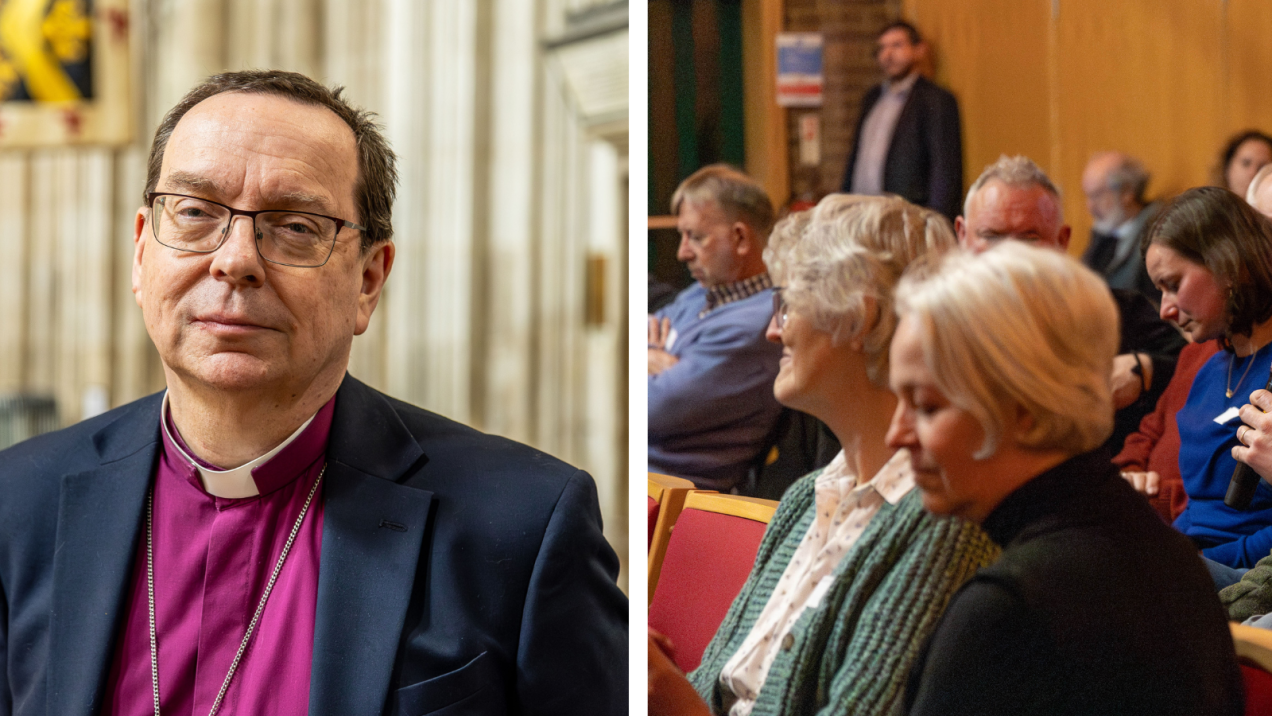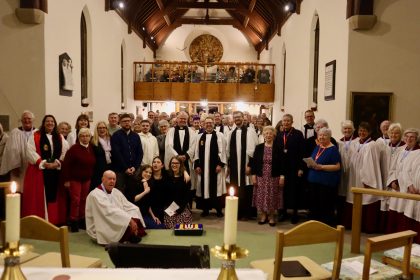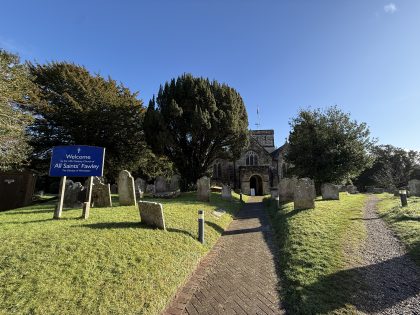Bishop Philip gave a presidential address at Diocesan Synod on 25 June, at St Paul’s Church, Bursledon. Read the transcript below:
There is, apparently, an ancient Chinese curse that runs, ‘May you live in interesting times.’ On that basis I can imagine therefore that we are cursed because we do indeed live in interesting times. But I also want to say, on the basis of what I see around me, I do believe that we also live in very blessed times, and I delight that we do.
Let me start with some of that evidence of blessing, before I come on to some things that are more challenging, before I try to bring them all together.
I do believe that we live in blessed times. You may well have heard the research around what is called ‘The Quiet Revival’ and the large number of young people, especially, who are exploring and finding Christian faith for themselves. I hear and see so much evidence of this in our diocese and further afield too. But here are two national statistics to set alongside other things you may have heard:
‘The Way UK’ is an online C of E presence, on platforms such as Instagram, and which is aimed at Gen Z – which is to say those born typically between 1997 and 2012: and it has no fewer than 5% of the UK’s 13–17-year-olds signed up to it, and those behind it are aiming for 10% of that age group.
Secondly, there has been an 87% growth of Bible sales in 5 years, driven largely by that same demographic, Gen Z. That is not far short of a doubling in sales.
And there’s much that is encouraging locally too. There are many stories of people – especially young people – walking into our churches and encountering the living Jesus in them. Rhiannon and I find ourselves confirming significant numbers of young people including young men. But here are some harder facts, from the preliminary 2024 Statistics for Mission:
Our ‘Worshipping Community’ increased by 6.8% between 2024 and 2023, whilst the national average was 1.2%. This places us in the top 5 dioceses for growth. Child Usual Sunday Attendance increased by even more, by 10.2%. Our average weekly giving increased in 2023 by 8% up 5% on the previous year, and we’ve also seen an 11% increase in CMF Collection rates for the first quarter of this year (on an increased total request).
Colin would want me to caveat all that by saying that these are only preliminary figures and may change. It’s also remembering that the numbers we’re dealing with are relatively small, so one or two errors in the data can end up having quite large impacts on percentages. All that being said, this does seem like very good news for which we should thank God. And set alongside that the continuing very healthy numbers of people we are sending forward into training for ordination.
It’s against that background that we are developing our diocesan strategy, and, as a key component of it, our ambitious bid from the Strategic Mission and Ministry Investment Board, which we will look at in more detail at our next meeting. But I’m convinced we should be genuinely ambitious in our praying and planning. This is certainly not the time to be cautious. ‘Aslan is on the move.’
It’s against that background too that we are continuing the appointment processes for a Dean of our Cathedral and a new Bishop of Basingstoke. Indeed, I’m delighted to say that we had a very successful interview day on Monday and I look forward very much to introducing our new Bishop to you in due course.
Something does indeed seem to be stirring spiritually in this country at the moment, and further afield too – I hear similar stories in France, for instance. I think we should attend very carefully to what is going on.
One lesson, I think, of all this is that people are drawn to authenticity, to depth and meaning; to humility and fragility, to experience and mystery; to a full-bodied engagement of head, heart, and hands. Paul Williams, CEO of the Bible Society who commissioned ‘The Quiet Revival’ research said, ‘full fat Christianity is back’. Tom Holland says that we should be afraid, as he puts it, to emphasise the weird stuff. Mystery and the miraculous seem to be what cut it – and in that light we should note soberly that it is both Catholic and Pentecostal expressions of Christian faith that have benefitted most from the revival – rather than the C of E. Nonetheless we are seeing life and health and growth amongst us and we should give the lie to that old, tired narrative that the decline of the C of E is inevitable and irreversible. It is neither of those things.
We have to give the lie to that narrative. Rather, prayer is vital and expectation is key, and it may just be that our prayers that we might be younger and more diverse as a Church might actually be being answered! So let’s pray all the more! And, certainly, let us not shy away from emphasising all that is mysterious and miraculous about our faith.
But in the light of all that is very encouraging, why did I start by suggesting we might be ‘cursed to live in interesting times’? Well, I don’t, of course, believe we are cursed. We are the people of the living God, living within his unbreakable covenant of love. We are not cursed. But we do live in difficult times.
That’s true domestically in the C of E. We will spend time looking at the LLF process in this meeting, and rightly so. But I think there is an increasing feeling that the process has rather run into the sand, and I’m not entirely sure where we go with it next. But it is sadly true that is had been an attritional process, and eroded trust and increased divisions across the Church. Some of that will no doubt be exposed afresh at General Synod in the next couple of weeks. But as we discuss this tonight let us resolve to do so in as positive atmosphere as we can – as we did a couple of months ago at our clergy study day on this same issue.
Looking further afield we see continued and untold suffering in Gaza and the West Bank, and are witnessing what could be war on a devastating scale in the Middle East. At the same time ‘big men’ the world over continue to try to impose their will on their own populations, with the persecution of religious minorities, Christians most prominent amongst them, relentlessly on the rise. We are in a more dangerous time globally that at any point since the end of the Cold War.
But there are worrying developments in this country too, and I cite specifically the votes in the same week around the decriminalisation of abortion and assisted dying – what should be better called assisted suicide. I don’t expect you all to agree with me on this, but I think both developments are deeply concerning and tragically undervalue human life both at its start and at its end. I’m also very concerned about how scant the examination of these huge subjects has been: both I think should have been the subject of Royal Commissions, not an amendment to one bill on the one hand and a Private Member’s Bill on the other. This was not Parliament at its best. We will face a busy time in the Lords as we address the Assisted Dying bill and I do crave your prayers for that – and apologies in advance if I have to shift things in my diary at short notice but I am very conscious of my duty in this area.
For over 1500 years in this country we’ve recognised that’s it’s the responsibility of the most able in our society to protect the most weak and vulnerable. Now we risk placing the lives of the most weak and the vulnerable at the convenience of the most able. The motivation behind the former conviction was, of course, the Christian faith. The motivation behind the latter is at best a naive, simplistic belief in autonomous human agency, that dismisses all too easily everything the Christian faith teaches about human nature’s propensity for selfishness and evil.
And so we have a deep irony that while Gen Z are rediscovering Christian faith, Gen X, the post baby boom generation, who predominate in the Commons, have largely rejected it, if indeed they ever knew anything about it, and are intent on unpicking the Christian fabric on which our society has been built.
I’m very conscious that this has been an address of two halves – both encouraging and sobering. How do we hold them together? In one way they may be more related than we think. One reason that has been suggested for the rediscovery of faith is that this world is indeed a scary place, and Gen Z may be the first generation to believe that the future will not be better than the past so why would people not look for meaning and hope in the ancient ways of the Christian faith? I’m delighted they do.
And why would we, as the followers of Jesus, think it would not be like this? On the night before he died he said this to his disciples: ‘I have said [all] this to you, so that in me you may have peace. In the world you face persecution. But take courage; I have conquered the world!’ In Jesus there is indeed peace, and we can indeed take courage, because he has conquered the world. His Kingdom is indeed breaking in. So however interesting the times we live in may be, let us be renewed ourselves, as his Church, in our commitment to him, and give ourselves afresh to the wonderful work of his inbreaking Kingdom. For his Kingdom is indeed coming. Amen.




